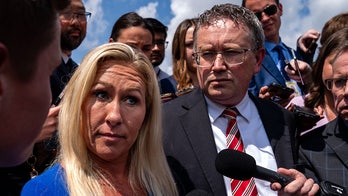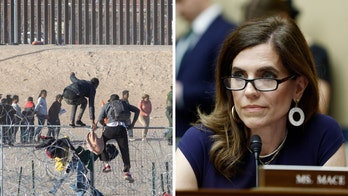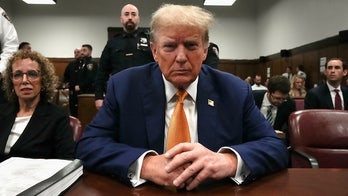The third and final Presidential Debate on foreign policy began with a reference to the 50th anniversary of the Cuban Missile Crisis.
"Perhaps the closest we've come to nuclear war," CBS moderator Bob Schieffer said, and a "sobering reminder" of unexpected national security threats.
A powerful open, but by debate's end: viewers were left with just a fleeting mention of Latin America, no substantive discussion of the entire western hemisphere, and not one mention of a brutal drug war affecting one of our largest trade partners - Mexico.
To be fair, Schieffer did not pose a question about the region - much to the chagrin of many Latinos who took to social media to bemoan Latin America's virtual absence.
So, without a further ado, here it is: a fourth presidential debate (that never happened) between President Barack Obama and presidential candidate Mitt Romney on Latin American issues.
- Romney vs Obama Final Debate: Why Latin America Matters, And Not Being Discussed
- Presidential Debate: Candidates Spar Over Syria, Iran, China, but Just a Quick Reference to Latin America
- Presidential Debate: In Round Two, Will Immigration and Latin America Come Up?
- Latin America’s Best Spas
- Budget Travel: Most Unusual Hotels in Latin America
- Eco-Friendly Travel in Latin America
- Best Latin American Cities for Foodies
MEXICO DRUG WAR
In the last six years, there have been over 60,000 murders in Mexico due to a brutal drug war. According to U.S. officials, As President, what will you do to help fight the war on drugs?
COMMON GROUND: Both Romney and Obama have shown little interest in this election on Mexico's War on Drugs. Mexico, though, has pointed out the drug trade is a shared problem in need of a shared solution. Both presidential candidates have said the war is a shared responsibility because of drug use in the United States.
"The president of the United States must make a priority of helping reduce demand in this country, and communicating to our young people, and older people, that when they use these illegal drugs, they are contributing to the deaths of people around the world," Romney said in a Univision debate in September.
Obama has held the same stance the last three years.
Both presidents are not in favor of legalizing drugs, or decriminalizing drugs as a solution to the war.
“I don’t mind a debate around issues like decriminalization,” Obama said at the Summit of the Americas summit in Cartagena, Colombia. “I personally don’t agree that’s a solution to the problem.”
DIFFERENCES: The Obama administration says it has "strengthened international partnerships" to reduce the supply of drugs from South America. Obama is a supporter of the Merida Initiative, a security cooperation initiative in which the U.S. spends nearly 500 million to provide Mexico and Central America with training, equipment and intelligence.
Romney wants to build an impermeable" border fence on the border to block out "illegal migrants, trans-national criminal networks and terrorists." He wants to boost "existing anti-drug and counter terrorism initiatives" and form a unified Hemispheric Joint Task Force on Crime and Terrorism. He wants to explore ways to enhance the Merida initiative, thereby increasing America's military presence in Mexico much like the U.S.'s past involvement in Colombia.
TRADE
What needs to be done to insure better economic relationships with Latin America?
COMMON GROUND: The truth is both candidates want more trade with Latin America. Why wouldn't they? Mexico ($500 billion) is the third largest trade partner with the United States behind only Canada ($681 billion) and China ($539 billion). Latin America is especially important to American jobs. It exports twice as much to Mexico as to China ($233 billion vs. $129 billion in 2011). It exports more to Latin America than to all of Europe. It exports more to Chile and Colombia than to Russia.
DIFFERENCES: The point of contention on this issue is really "Are we trading enough?" Romney has voluntarily brought up Latin America in the debates in an attempt to bring this question to the forefront. Data shows U.S. trade with Latin America has grown faster in the last 12 years than with any other region. Romney has said he wants to do even more.
Obama hasn't mentioned Latin America in this year’s debates. The president has signed free trade agreements with Panama and Colombia in October 2011, but Republicans are quick to point out they were originally negotiated under George W. Bush, and were held up in Congress because of pressure from labor unions and human rights activists.
CUBA
What is your policy toward Cuba?
COMMON GROUND: Both Obama and Romney share a common goal of ending Castro's rule. But neither Obama nor Romney have offered any major new policies to get closer to that goal.
DIFFERENCES: As a whole, both candidates don't drift from their party stances, on relations with Cuba. Washington is primarily divided by the 52-year-long trade embargo with the island.
Obama and the Democrats say engagement with the island is better than isolation. The president has promised to end the embargo and to loosen travel restrictions with Cuba. In 2009, Obama allowed families to travel to Cuba, allows remittances, and allowed telecommunication companies to establish systems there. In 2011, travel was expanded to students from credited institutions and allowed money to be sent for religious promotion.
"The primary means we have of encouraging positive change in Cuba today is to help the Cuban people become less dependent on the Castro regime in fundamental ways," Obama wrote in an August 2007 op-ed published in the Miami Herald before his presidency. "U.S. policy must be built around empowering the Cuban people, who ultimately hold the destiny of Cuba in their hands."
Romney and the Republicans want to continue to squeeze the Communist government until the regime collapses. They believe that until Cuba it is run as a democracy, no concessions should be made. The former Massachusetts governor even has adopted the tag line "no accommodation, no appeasement." The GOP candidate believes Obama follows an appeasement strategy with Cuba and has outlined a 10-point plan that includes reinstating travel and remittance restrictions.
Latinos have expressed more confidence in Obama as whole, except for Cuban-Americans, who view Republicans as tougher at handling enemies – like the Castro brothers and Venezuelan President Hugo Chavez – of the United States.
VENEZUELA
How would you handle the relationship between the U.S. and Venezuela today?
Common Ground: Both candidates disapprove of the socialist Venezuelan president, Hugo Chavez. Chavez has postured as an enemy of the U.S. and has aligned himself with other socialist-leaning nations in the Western Hemisphere, such as Cuba, Ecuador, Bolivia and in the East with Iran and North Korea.
Differences: President Obama and Romney differ on how dangerous the leader is.
The Obama administration has expressed disapproval over Chavez’s leadership, but the president said he views Chavez as less of a threat to the region than Bush did. Obama has also expressed an interest in having dialogue with Chavez in an effort to improve relations.
“Because of President Obama’s leadership, our position in the Americas is much stronger today than before he took office," said a statement by campaign press secretary Ben LaBolt. "At the same time, Hugo Chavez has become increasingly marginalized and his influence has waned. It’s baffling that Mitt Romney is so scared of a leader like Chavez whose power is fading, while Romney continues to remain silent about how to confront al-Qaeda or how to bring our troops home.”
Romney continues to push that he would be tough on leftist leaders like Chavez, and finds it “extraordinary” that Obama doesn’t pose him as a threat.
“This is Chavez who has invited Iran in, who has invited Hezbollah,” Romney has said. “Hezbollah, of course, being a surrogate and a proxy for Iran would potentially have access to weapons that could be used against us. This is Chavez who champions the Bolivarian Revolution movement and is spreading dictatorships and tyranny throughout Latin America.”
Follow us on twitter.com/foxnewslatino
Like us at facebook.com/foxnewslatino




